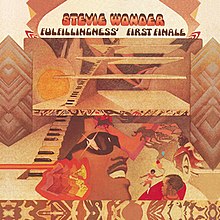Fulfillingness' First Finale
| Fulfillingness' First Finale | ||||
|---|---|---|---|---|
 |
||||
| Studio album by Stevie Wonder | ||||
| Released | July 22, 1974 | |||
| Recorded | Record Plant Studios and Westlake Recording Studios in Los Angeles; Media Sound and Electric Lady Studios in New York City | |||
| Genre | Soul | |||
| Length | 42:33 | |||
| Label | Tamla | |||
| Producer | Stevie Wonder, Robert Margouleff and Malcolm Cecil | |||
| Stevie Wonder chronology | ||||
|
||||
| Singles from Fulfillingness' First Finale | ||||
|
||||
| Professional ratings | |
|---|---|
| Review scores | |
| Source | Rating |
| AllMusic | |
| The Austin Chronicle | |
| Christgau's Record Guide | A– |
| Encyclopedia of Popular Music | |
| The Great Rock Discography | 7/10 |
| Los Angeles Times | |
| MusicHound | 4/5 |
| Q | |
| The Rolling Stone Album Guide | |
| The Village Voice | B+ |
Fulfillingness' First Finale is a 1974 album by Stevie Wonder; widely considered one of the albums from his "classic period". Released on July 22, 1974 on the Tamla label, it is Wonder's nineteenth album overall, and seventeenth studio album. According to Billboard magazine, it was Wonder's first studio album to top the Pop Albums chart where it remained for two weeks, while it was his third album to top the R&B/Black Albums chart where it spent nine non-consecutive weeks.
Subsequent to the epic sweep and social consciousness of Innervisions, this set projected a reflective, decidedly somber tone. The musical arrangements used in several songs while masterly could be considered sparse in comparison to others among his 1970s masterworks, evident especially in the bleak "They Won't Go When I Go" and understated "Creepin'". While largely a stripped down, more personal sounding record, Wonder had not completely foregone social commentary on the world around him. The No. 1 hit "You Haven't Done Nothin'" launched a pointed criticism of the Nixon administration bolstered by funky clavinet, drum machine, and a Jackson 5 cameo.
The album received three Grammy Awards, including Album of the Year, in 1974.
Fulfillingness' First Finale won Grammy Awards for Best Male Pop Vocal, Best Male Rhythm and Blues Vocal Performance (for "Boogie On Reggae Woman"), and Album of the Year in 1974.
...
Wikipedia
